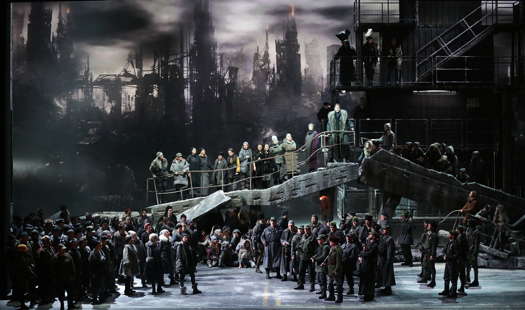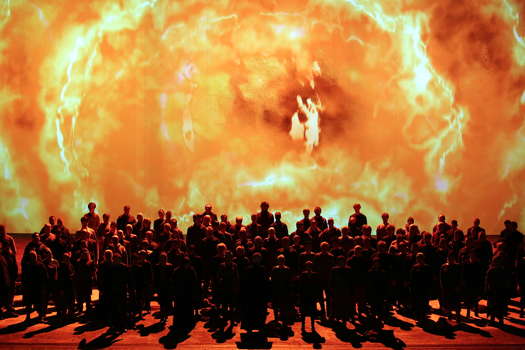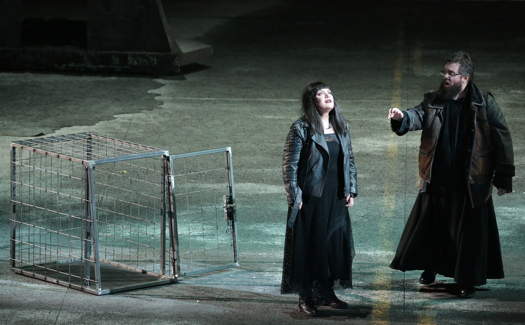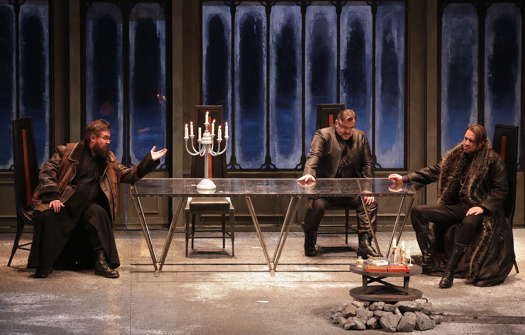 DISCUSSION: What is a work? John Dante Prevedini leads a discussion about The performing artist as co-creator, including contributions from Halida Dinova, Yekaterina Lebedeva, Béla Hartmann, David Arditti and Stephen Francis Vasta.
DISCUSSION: What is a work? John Dante Prevedini leads a discussion about The performing artist as co-creator, including contributions from Halida Dinova, Yekaterina Lebedeva, Béla Hartmann, David Arditti and Stephen Francis Vasta.

A Popular Music Drama
GIUSEPPE PENNISI is impressed by
Musorgsky's 'Khovanshchina' at La Scala Milan
Musorgsky's 'Khovanshchina' at La Scala Milan
A new production of Chovánščina (also written as Khovanshchina or 'The Chovanskij Affair') by Modest Mussorgsky is enthralling audiences at La Scala. The debut was on 27 February 2019. I saw, and listened to, the 3 March matinée performance. It is in La Scala's schedule until the end of March. Opera lovers from all over Italy, as well as from abroad, are travelling to Milan to see, and listen to, the production. I consider it as a good candidate for the next 'Premio Abbiati', the prize awarded each year by the Italian National Association of Music Critics. There are three main reasons.
The production, financed by several private sponsors but not in a joint venture with other opera houses, is a clear demonstration of the quality of La Scala's artistic resources - chorus, orchestra and laboratories for sets and costumes. Khovanshchina is called 'a popular music drama' by its composer; consequently, the chorus, led by Bruno Casoni, is its real protagonist. The numerous characters emerge from the chorus and are later submerged by the chorus itself. In its several capacities: as musketeers at the service of Prince Ivan Khovansky, as the chief of schismatic 'old believers', as the troops of the progressive Prince Golitsyn, as the wives of both the former and the latter, and especially as the Russian populace at large, the chorus sang and acted magnificently.

La Scala's chorus in Musorgsky's 'Khovanshchina'. Photo © 2019 Brescia/Amisano
Under Valery Gergiev, the orchestra handles the large, impervious score. As is well known, Mussorgsky neither finished nor orchestrated the work. For several years, Khovanshchina was performed as completed and orchestrated by Rimsky-Korsakov. After the publication of the critical edition of the manuscript in 1931, Ravel and Stravinsky prepared a new version, especially for performances in Paris. Later, in 1961, Shostakovich provided a new orchestration which is viewed as the closest to Mussorgsky's intentions. Gergiev follows this dark Shostakovich version with a few minor and quite irrelevant cuts. There are, however, two important modifications. At the end of Act II, there is a long sustained low note, as Mussorgsky indicated in his brief. At the end of Act V, there's a repeat of the final choral statement but without text and giving the melody to unison brass to bring it through the orchestral texture in a suitable climatic manner. These are a challenge for the orchestra and chorus, but they responded perfectly.

A scene from Musorgsky's 'Khovanshchina' at La Scala, Milan. Photo © 2019 Brescia/Amisano
Khovanshchina is a massive canvas of many conflicting tragedies, fears, ambitions, hopes and disillusions for Russia. There are also religious wars between different factions of Orthodox Churches and attempts by German Lutherans to make inroads into Russia.
Often stage directors, set and costume designers strive for grand tableaux of seventeenth century Moscow and its surroundings. The production team - Mario Martone (director), Margherita Palli (sets), Ursula Patzak (costumes) and Pasquale Mari (lighting) - takes a different view. The 'popular music drama' is a timeless and universal pessimistic view of the human condition. In the production, Moscow is half-built and yet half-destroyed. There is an impressive skyline of high-rise buildings in the background; but the foreground of the stage is a shambles. The action takes place in winter or late autumn; the sky is grey and sombre, in line with the dark score. There is no room for oleographic pictures of the wealth of the Czars and oligarchs of the seventeenth century. Black and grey dominates this vision of a humanity without hope, where reformers and reactionaries are fighting without a clear purpose.

Ekaterina Semenchuk as Marfa and Stanislav Trofimov as Dosifei in Musorgsky's Khovanshchina at La Scala, Milan. Photo © 2019 Brescia/Amisano
The singers are splendid. I mention only the principals of the vast cast. Mezzo Ekaterina Semenchuk is Marfa, the music drama's most important character. She descends to a very low register like an alto, even in pianissimo. Tenor Sergey Skorokhodov is the young Prince Andrei Khovansky; Marfa is in love with him but he betrays her with the German Emma until they die together in the final holocaust of the 'old believers'. Emma is Evgenia Muravena, a magnificent singer for a comparatively small part. Stanislav Trofimov is Dosifei, the charismatic leader of the 'old believers': he is both ascetic and grandiose. The two main contenders for power in Moscow as well all over Russia are Mikhail Petrenko (Ivan Khovansky, apparently conservative or even reactionary) and Evgeny Akimov (Prince Golitsyn, seemingly a progressive reformer). They are, respectively, a bass and an agility tenor. They have excellent voices: they depict two ambitious and lusty personalities, both doomed to be defeated.

From left to right: Stanislav Trofimov as Dosifei, Evgeny Akimov as Prince Golitsyn and Mikhail Petrenko as Ivan Khovansky in Musorgsky's Khovanshchina at La Scala, Milan. Photo © 2019 Brescia/Amisano
The audience was just enthusiastic.
Rome, Italy



